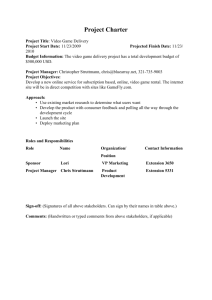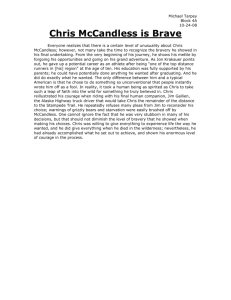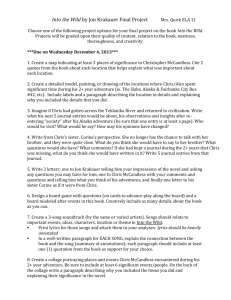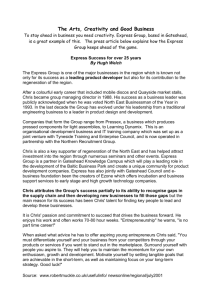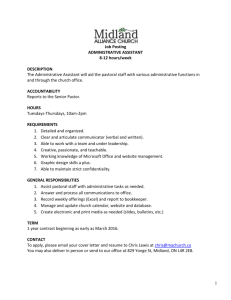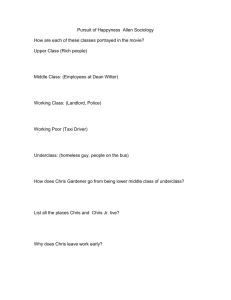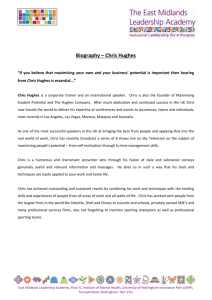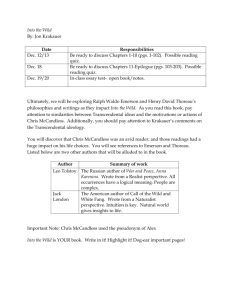Your teacher's notes on Into the Wild
advertisement
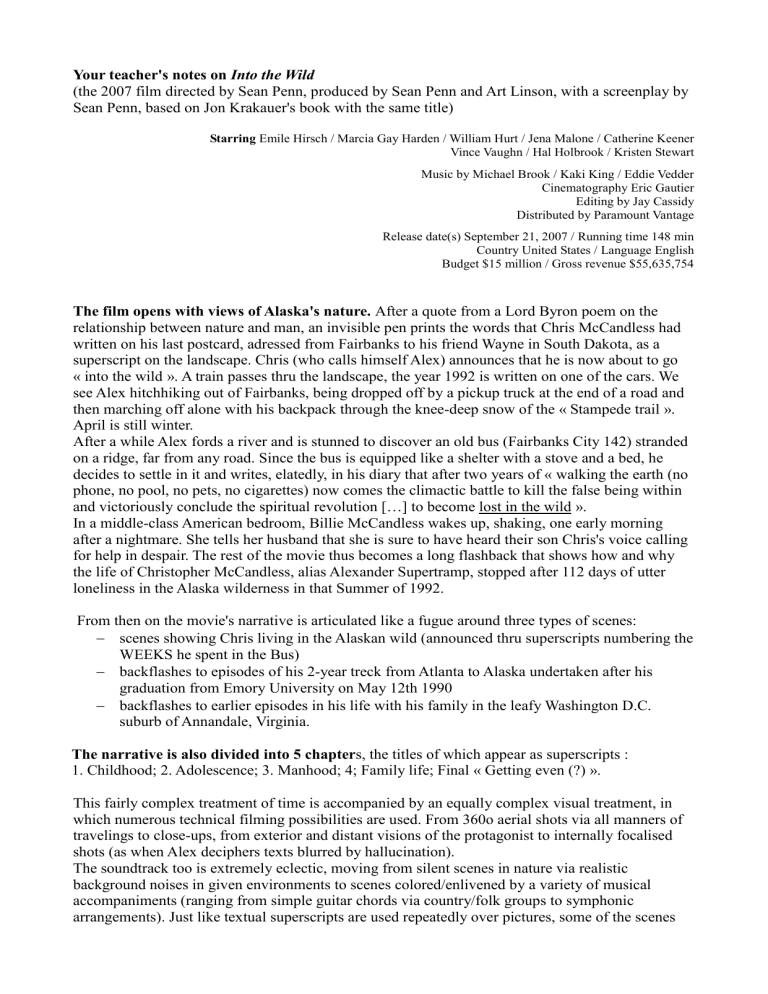
Your teacher's notes on Into the Wild (the 2007 film directed by Sean Penn, produced by Sean Penn and Art Linson, with a screenplay by Sean Penn, based on Jon Krakauer's book with the same title) Starring Emile Hirsch / Marcia Gay Harden / William Hurt / Jena Malone / Catherine Keener Vince Vaughn / Hal Holbrook / Kristen Stewart Music by Michael Brook / Kaki King / Eddie Vedder Cinematography Eric Gautier Editing by Jay Cassidy Distributed by Paramount Vantage Release date(s) September 21, 2007 / Running time 148 min Country United States / Language English Budget $15 million / Gross revenue $55,635,754 The film opens with views of Alaska's nature. After a quote from a Lord Byron poem on the relationship between nature and man, an invisible pen prints the words that Chris McCandless had written on his last postcard, adressed from Fairbanks to his friend Wayne in South Dakota, as a superscript on the landscape. Chris (who calls himself Alex) announces that he is now about to go « into the wild ». A train passes thru the landscape, the year 1992 is written on one of the cars. We see Alex hitchhiking out of Fairbanks, being dropped off by a pickup truck at the end of a road and then marching off alone with his backpack through the knee-deep snow of the « Stampede trail ». April is still winter. After a while Alex fords a river and is stunned to discover an old bus (Fairbanks City 142) stranded on a ridge, far from any road. Since the bus is equipped like a shelter with a stove and a bed, he decides to settle in it and writes, elatedly, in his diary that after two years of « walking the earth (no phone, no pool, no pets, no cigarettes) now comes the climactic battle to kill the false being within and victoriously conclude the spiritual revolution […] to become lost in the wild ». In a middle-class American bedroom, Billie McCandless wakes up, shaking, one early morning after a nightmare. She tells her husband that she is sure to have heard their son Chris's voice calling for help in despair. The rest of the movie thus becomes a long flashback that shows how and why the life of Christopher McCandless, alias Alexander Supertramp, stopped after 112 days of utter loneliness in the Alaska wilderness in that Summer of 1992. From then on the movie's narrative is articulated like a fugue around three types of scenes: scenes showing Chris living in the Alaskan wild (announced thru superscripts numbering the WEEKS he spent in the Bus) backflashes to episodes of his 2-year treck from Atlanta to Alaska undertaken after his graduation from Emory University on May 12th 1990 backflashes to earlier episodes in his life with his family in the leafy Washington D.C. suburb of Annandale, Virginia. The narrative is also divided into 5 chapters, the titles of which appear as superscripts : 1. Childhood; 2. Adolescence; 3. Manhood; 4; Family life; Final « Getting even (?) ». This fairly complex treatment of time is accompanied by an equally complex visual treatment, in which numerous technical filming possibilities are used. From 360o aerial shots via all manners of travelings to close-ups, from exterior and distant visions of the protagonist to internally focalised shots (as when Alex deciphers texts blurred by hallucination). The soundtrack too is extremely eclectic, moving from silent scenes in nature via realistic background noises in given environments to scenes colored/enlivened by a variety of musical accompaniments (ranging from simple guitar chords via country/folk groups to symphonic arrangements). Just like textual superscripts are used repeatedly over pictures, some of the scenes are commented by the off-voice of Chris's sister Carine (who, as in the life of the real McCandless, is presented as his closest friend). Like her parents, Carine last saw her brother on is graduation day at Emory, an event which is shown like a typical main-stream American affair from the point of view of the middle-class parents. But the father's pride in his son's achievements (a GPA of 3.72 for a degree in history and anthropology which would allow him to enter even the Harvard Law School) is met by a firm, even angry refusal of the new car he is presented with. Such an unsual slight hints at a deep father-son relational problem. When Chris is alone again, he sends a check of 24,500 $ - the total remaining sum on his college fund – to a Charity and is shown slashing his bank and Social Security cards (according to Lamothe, this detail does not correspond to the true story of C.M.) before vacating his room and taking to the road - « West, where freedom lies » - in his trusted old Datsun. This is the birth of the new Chris who will now call himself Alexander Supertramp. Chapter 1 Childhood starts rather abruptly with Chris losing his car in a flash-flood early on in his trip, while spending a night off the interstate in Arizona. He proceed then as a hitchhiker and experiences his walk thru the wooded mountains along the « Pacific Crest Trail Northwest » as a wonderful idyll. Having been picked up by a couple of middle-aged hippies in a camping van, Jan and Rainey, he hits the Pacific coast with them and is told in enthusiastic terms about their intention to go and leave on the cheap at a hippie place in the desert, called The Slabs. This is in stark contrast with the middle-class aspects of Chris's earlier life with his family in Virginia, as told by his sister's off-voice. Chapter 2 Adolescence starts after Week 3 at the Magic Bus when a worried Chris notes that he is facing a « rice-warning » and that he has found « no game » to shoot in order to improve his diet. But the Spring thaw has come and he feels enthusiastic. Another flashback to his trip West shows him in South Dakota in September 1990 being initiated to harvesting corn with a giant combine by a a friendly farmer, Wayne Westerberg, to whom he confides his dream of wanting to live in « Alaska-Alaska », to « just be out there -in the Wild ». This job and the friendship with Wayne gets interrupted brutally by Wayne's arrest by the FBI for some illicit use of decoders. Before being hauled off, Wayne advises Chris to forget about Alaska till Spring and head South till then. Chris does that and while passing thru California (President Georges Bush Senior can be seen on some TV screen), we are told by Carine's off-voice of the shock that Chris had experienced when finding out on his first big trip alone after graduating from highschool, that his father had maintained ties to his first wife in LA after starting to live with Chris and Carine's mother, and even fathered another son with that first wife, 2 years after Chris's birth. Now, in December 1990, we see Chris rafting recklessly, inspite of his phobia of water, and without a helmet or permission, down the Colorado river. He then meets with a friendly Scandinavian couple in Grand Canyon who tell him about the possibility of canooing all the way from the Hoover Dam to the Gulf of Mexico, or the Sea of Cortes. Which Chris promptly does inspite of serious difficulties and obstacles. He reaches Mexico on Dec. 2Nd 1990, almost calls his sister from a public phone-booth but finally gives his only quarter to an old man. An idyllic scene shows Chris running in a large field with wild horses. Having reintered US-territory as a thin and dirty ID-less vagrant, he rides freight trains to LA where he sleeps at the mission and is close to diving under among the homeless and destitutes. He seems to realise how utterly removed he is from the Californian yuppies dining on restaurant terrasses by the ocean. Rather than getting a new driver's licence issued in his name, he now claims to be called « Alexander Supertramp » and moves on toward the North. Chapter 3 Manhood shows Chris being viciously kicked off a freight train by a vigil who threatens to kill him if he ever catches him again. The film then jumps forward to Week 7 at the bus, where Chris needs to tighten his belt again. With a background music of nice Western music we see him building a log bridge across the river and a simple shower with a pierced bucket. Wonderful camera work depicts him elatedly reading Jack London's Call of the Wild, while living right in it. The narrative returns to his earlier stay in California where he is shown working at a Burger King, a job he quits after being told that it requires him to wear socks. This alternates with Carine's comments on her brother's psychology and the increasing worriedness of their parents who have not heard from Chris for almost a year now. Back at the bus Chris manages to kill a moose and goes to work frantically in order to cure its meat according to the advice that he had been given while in South Dakota. But he cannot beat the assault of the flies and the whole bloody experience develops into a gigantic failure that leaves Chris shaking with rage, exhaustion, and the feeling of having committed the « greatest tragedy of his life ». Also the attempt to cure the meat reminded him of scenes of his youth in which his father would refuse to let him light the barbecue fire and bully everyone else in the family on account of his superior competence. Chapter 4, Family life, shows Chris visiting with Jan and Rainey who « are doing real good » at the hippie settlement of Slab City (Dec. 18Th 1991). There he helps Rainey sell used books, works out to trim his body for his projected trip North, and gets to know a young and pretty folk singer, Tracy T., who falls in love with him. They end up singing together at musical evenings but when Tracy invites him into her trailer to make love, Chris says that they « cannot do that » on account of her age. Together they visit the surrealist sculpture on top of Salvation Mountain, made by an old man who asserts that « God is love » and that « good gets better, here, in the desert ». While Chris tells Jan and Rainey about his Alaskan idee fixe, Jan tells him about how badly she hurts for not having had any news from her teenage son, Reno, who left her two years before. Although Chris tells Tracy that she is « pretty magic », but he leaves her and The Slabs to move on. Back at the Magic Bus, Week 9. A very gaunt Chris reads Tolstoy and gets struck by the writer's insistence on « family happiness » as the mainstay for « simple people ». He takes a picture of himself smiling, sitting against the bus – which will be his last. He prepares his pack in order to leave but finds himself stopped by the rushing waters of the river, turned into a torrent by the Summer thaw, and is forced to return to the bus. Final chapter: Getting Even (?). Although he feels mentally healed and wants to leave the wilderness, Chris is trapped and notes in his diary « Rained in. Lonely! » A flashback takes him to the « O my God Hot Springs », a nudist camp in the Califorian desert, in the vicinity of which he had stayed for a while and where he met an old man, Ron Franz, while hitchhiking. Ron is soon charmed by Chris's idealism and energy and tells him how his wife and son were killed by a drunk driver on New Year's Eve in 1957, while he was stationed in Okinawa with the army. He then became a drunkard himself for years until he stopped drinking « cold turkey ». [Lovely guitar music during a fireworks display and Chris' jog.] Ron invites Chris to his house and teaches him his hobby: crafting leather belts. Chris makes one showing the highlights in his life. While Ron tries to convince Chris to give up his lonely lifestyle and become aware of love, Chris maintains that « happiness is not only people ». Back at the bus, Chris is turning crazy with hunger, gathers weeds and roots frantically, and gets sick after eating roots that he discovers too late to be highly poisonous. On day 100 of his stay in the wild he can barely move and while standing naked in a transe near the bus is met by an enormous bear that only sniffs at him before moving away. He then notes that he has « literally become trapped in the wild ». Back to March 22nd 1992, the day when Chris left Ron's place. In an emotional scene, before dropping Chris off by the highway to go on his « great Alaskan adventure », Ron offered to adopt him, since he had no heirs and was « the end of his line ». But Chris gently refused for the time and left the car with a bounce, in great shape. [Sentimental slideshow of pics of the McCandless family with sentimental music]. Back in the bus, shown like an island in the middle of the green Taiga, we see Chris scribbling his last words in his diary, « Happiness shared », then barely managing to wash his body off with dirty water and zipping himself in his sleeping bag, lying on the mattress inside the bus. Some final dream-like pictures are shown before we can hear him inhale his last breath.

